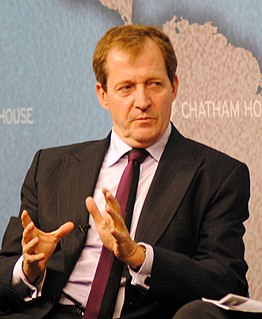Top 54 Quotes & Sayings by Alastair Campbell
Explore popular quotes and sayings by a British journalist Alastair Campbell.
Last updated on April 22, 2025.
Clinton is a big personality who has led a big life, and for some of the media conventional wisdom to boil it down to a view that 'all people are really interested in' are a few moments of madness in the Oval Office gets him, the importance of the presidency, and the significance of his life, all wrong.
My closest friend, who died not long ago, is buried near Marx's grave in Highgate cemetery, so I see the gaggle of admirers laying roses at the foot of his tombstone regularly. I have never been tempted to leave flowers there myself. Great theories, shame about the practice. Marx did many things. But inventing class was not one of them.
So here is one of my theories on happiness: we cannot know if we have lived a truly happy life until the very end. This view of life and death was reinforced by my close witnessing of the buildup to the death of Philip Gould. Philip was without doubt my closest friend in politics. When he died, I felt like I had lost a limb.
Paul Keating told us before we were elected that you can do deals with [Rupert] Murdoch without saying you were doing a deal. Did we do that kind of thing? Maybe. But from around about the turn of the century, I felt strongly that we had to do something about media ownership and self-regulation. Tony [Blair] disagreed.
I never met David Kelly, but I knew from what he told other people that this was not his view. The BBC were saying that Tony Blair was making up lies so that he could send young men and women to war, maybe to die. I think that if the BBC had done their jobs professionally, they'd have realised that you couldn't justify what they said. And nothing has emerged since to justify that report.
I feel like thanking Paul Dacre every time, because the reason they ask me is because they think I've come through the other end with a pretty good reputation. Loads of people get a bad press but have a good reputation. [David] Beckham - think what he went through. [Bill] Clinton, likewise. You just have to be true to yourself.
This may sound arrogant, but I believe that if we'd done teamship better, we'd still be there. Where we fell down was the inability to hold together. We should have learnt from the great football teams. The players may not like each other. They have egos, they have their own ambitions, they have different personalities, but they are still bloody good teams.
All of this is happening because there has still been no reckoning post the financial crisis. So governments have fallen, one bloke has been to prison, the banks have gone pretty well back to status quo, the rich are getting richer, and the poor are getting poorer. And it's fuelling anger. And somehow [Donald] Trump, who represents the worst aspects of capitalism, has persuaded people he can deal with that.

















